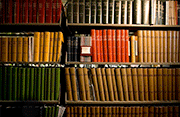E-Archive
Off the Beaten Track
in Vol. 16 - January Issue - Year 2015
Do You Remember?


One of the over 30,000 clay tablets found at Nineveh
Do you remember the first time your parents took you to a public library? The elderly lady at the front desk barely glanced at you as she returned your father's greeting. You gripped your mother's hand with sweaty palm while she guided you through a maze of rooms, hallways and yet more rooms. The walls were covered with shelves loaded with books reaching almost to the ceiling. There was a pungent smell of old paper and dust. Wherever you turned your head, people were staring intently at the books in front of them, with only an occasional murmur breaking the hushed silence that on first impact had seemed so oppressive. And yet, there was something fascinating about this place.
On your following visit to the library, you let go of your mother's hand at the front door and darted inside. You had learned to find your way to the children's section, where a roomful of books, all colorfully illustrated with stories of queens and princesses, knights and dragons, spaceships and monsters, was patiently waiting for you. Do you remember?
*****
When looking back to ancient times, it's not easy to define what constituted an actual library. The oldest collections of written documents were really more similar to archives. They were discovered in the Middle East and in Mesopotamia and dealt mainly with commercial transactions, census records, inventories and other official events. Over time, personal records, philosophical and theological writings began to appear. More importantly, some of these centers showed evidence of a systematic method of classifying documents, bringing them closer to our modern concept of library.
Even the definition of "document" deserves special consideration. The most ancient records were kept on clay tablets that were inscribed with a stylus while the clay was wet. The ancient Egyptians developed a much more practical and lighter support extracted from a water plant called papyrus, from which the word "paper" derives and which was used to make scrolls. When political and commercial tensions made papyrus harder to obtain, records were kept on parchments made from the prepared skin of an animal such as a goat or sheep. The Chinese later invented the papermaking process now used.
The earliest known library was discovered near Ebla, in modern-day Syria, and dates back to about 2500 B.C. It contained clay tablets in cuneiform script documenting inventories and commercial transactions. Another library was discovered in the same region near the ancient city of Ugarit. This library, probably established in the thirteenth century B.C., yielded several thousand clay tablets written in different languages, among which a previously unknown language called Ugaritic. In addition to diplomatic archives and census records, at this site, archeologists found many literary works and the earliest privately owned libraries yet recovered.
A huge leap in the understanding of ancient record keeping was made in 1850, when a vast collection of clay tablets was discovered under the ruins of a royal palace dating back to the seventh century B.C. at Nineveh, near modern-day Mosul in Iraq. This trove yielded over 30,000 clay tablets with the finest religious and literary works from ancient Mesopotamia, including the Epic of Gilgamesh, the Epic of Creation, numerous astronomical and astrological studies, not to mention many texts used by language and medical students. The specific order in which the tablets at Nineveh had been arranged is considered to be the first real library classification system in history.
During the same period in which the library at Nineveh was being founded, a large library with many palm leaf manuscripts was being created at Takshasila in the Indian subcontinent, while imperial courts across China and the Far East were taking similar initiatives.
However, in most cases access to libraries was limited to royalty and aristocratic or religious figures. Leaders gradually became aware of the political and social usefulness of the library and were forced to rethink their attitude towards this institution.
A more modern concept of library was born in the third and fourth centuries B.C. in Egypt and Greece and was further developed under the Roman Empire. This evolution had a profound impact on how these societies grew and it laid the foundation for the creation of libraries as we know them today; but that is another story...
By Giovanni Gregorat, Contributing Editor MFN



























